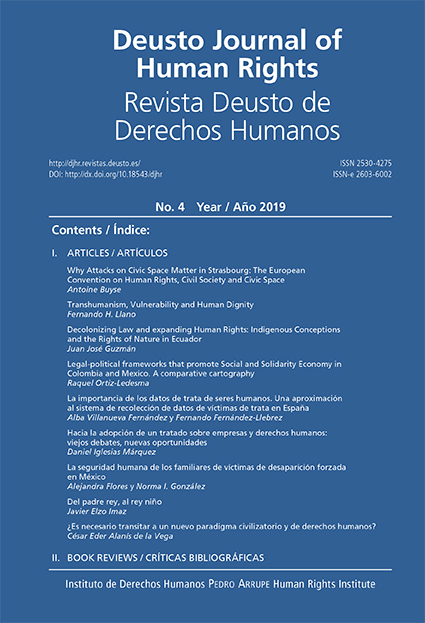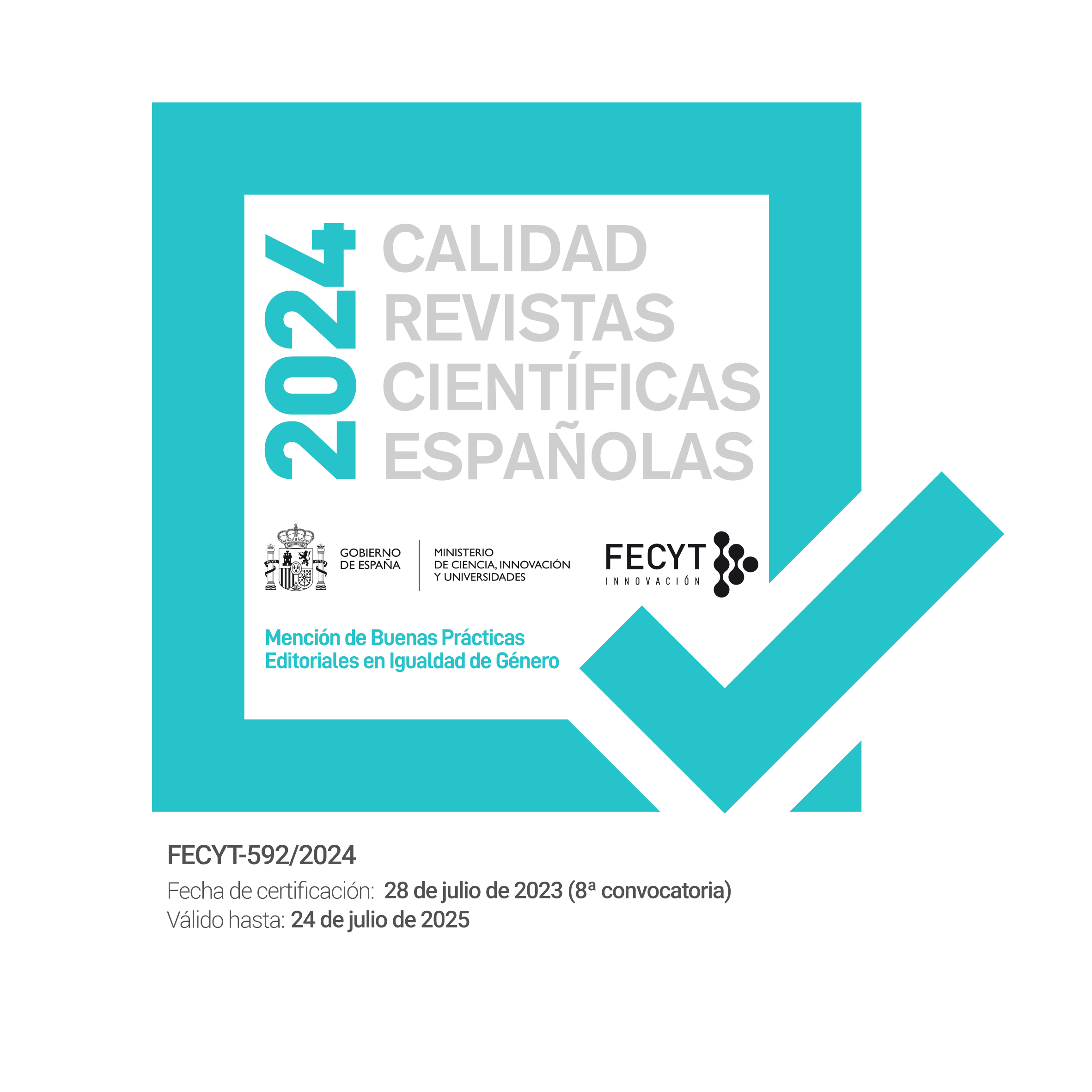Transhumanismo, vulnerabilidad y dignidad humana
Resumen
El movimiento transhumanista es mucho más que una mera utopía, una nueva corriente de pensamiento o una ideología de moda; en realidad, se trata de un proyecto científico-filosófico que ya está en marcha y que defiende el uso de las nuevas tecnologías emergentes más avanzadas —desde la biogenética, la informática, la nanotecnología y las ciencias cognitivas hasta la robótica y la Inteligencia Artificial— con el firme propósito de aumentar exponencialmente las capacidades físicas, cognitivas, sensoriales, morales y emocionales de los seres humanos. El transhumanismo supone un cambio en el paradigma antropocéntrico defendido por el humanismo, y pretende desbordar los límites de la naturaleza que hasta hace poco considerábamos insuperables para crear una nueva especie más evolucionada que la del Homo sapiens: el Homo excelsior, una especie posthumana superior a la nuestra, formada por seres superdotados que han sido seleccionados, diseñados y mejorados genéticamente que —de acuerdo con el imaginario transhumanista— dominarán el futuro posthumano y serán más felices, virtuosos, longevos e inteligentes que nosotros. En el presente artículo se propone el humanismo tecnológico como fórmula intermedia en el debate doctrinal entre iusfilósofos bioprogresistas y bioconservadores, de tal forma que sea posible el desarrollo de la investigación científica y el avance de las nuevas tecnologías, aunque nunca a costa del sacrificio de la dignidad y la libertad, que son cualidades inherentes al ser humano (que debe ser concebido, en términos kantianos, como un fin en sí mismo).
Recibido: 22 mayo 2019
Aceptado: 10 septiembre 2019
Publicación en línea: 20 diciembre 2019
Descargas
Citas
Atencia-Páez, José María. 2003. “Ortega y Gasset, meditador de la técnica”. Argumentos de Razón Técnica 3: 61-95.
Ballesteros, Jesús. 2007. “Biotecnología, biopolítica y posthumanismo”. In Biotecnología y posthumanismo, edited by Jesús Ballesteros and Encarnación Fernández, 21-46. Cizur Menor (Navarra): Thomson-Aranzadi.
Beck, Ulrich. 2016. The Metamorphosis of the World. Cambridge: Polity Press.
Bostrom, Nick. 2007. The Future of Humanity. Oxford: Faculty of Philosophy & James Martin 21st Century School. Oxford: Oxford University. https://nickbostrom.com/papers/future.pdf
Buchanan, Allen. 2000. From Chance to Choice. Genetics and Justice. Cambridge: Cambridge University Press.
Buchanan, Allen. 2011a. Better than Human. The Promise and Perils of Enhancing Ourselves. Oxford: Oxford University Press.
Buchanan, Allen. 2011b. Beyond Humanity? The Ethics of Biomedical Enhancement. Oxford: Oxford University Press.
Diéguez, Antonio. 2017. Transhumanismo. La búsqueda tecnológica del mejoramiento humano. Barcelona: Herder.
Dworkin, Ronald. 2000. “Playing God: Genes, clones, and luck”. In Sovereign Virtue. The Theory of Practice of Equality, 427-452. Cambridge (Massachusetts): Harvard University Press.
Fernández Ruiz-Gálvez, Encarnación. 2007. “Crítica filosófica del posthumanismo: Gabriel Marcel”. In Biotecnología y posthumanismo, edited by Jesús Ballesteros and Encarnación Fernández, 81-108. Cizur Menor (Navarra): Thomson-Aranzadi.
Ferry, Luc. 2017. La révolution transhumaniste: comment la technomédecine et l´uberisation du monde vont bouleverser nos vies. Paris: Plon.
Frosini, Vittorio. 1986. L´uomo artificiale. Etica e diritto nell´era planetaria. Milano: Spirali.
Fukuyama, Francis. 2002. Our Posthuman Future. Consequences of the Biotechnology Revolution. New York: Picador/Farrar, Straus and Giroux.
Habermas, Jürgen. 1968. “Technischer Fortschritt und sociale Lebenswelt”. In Technik und Wissenschaft als “Ideologie”, 104-118. Frankfurt am Main: Suhrkamp Verlag.
Habermas, Jürgen. 1981. “Modernity versus Postmodernity”. New German Critique 22: 3-14. Seyla Ben-Habib.
Habermas, Jürgen. 2003. The Future of Human Nature. Cambridge: Polity Press.
Harari, Yuval Noah. 2014. Sapiens. A Brief History of Humankind. London: Penguin Random House.
Harari, Yuval Noah. 2017. Homo Deus. A Brief History of Tomorrow. London: Vintage Penguin Random House.
Heidegger, Martin. 1989. Entrevista del “Spiegel”, trad. Esp. R. Rodríguez. Madrid: Tecnos.
Jonas, Hans. 1984. The Imperative of Responsability: In Search of an Ethic for the Technological Age. Chicago: The University of Chicago Press.
Kant, Immanuel. 1968. Kritik der praktischen Vernunft (1788). In Kants Werke (V), Akademie Textausgabe. Unveränderter photomechanischer Abdruck von Kants gesammelte Schriften. Herausgegeben von der Königlich Preussischen Akademie der Wissenschaften, 1-164. Berlin: Walter de Gruyter & Co.
Lewis, Clive Staples. 2002. The Abolition of Man. New York: The Agustine Club at Columbia University. https://archive.org/stream/TheAbolitionOfMan_229/C.s.Lewis-TheAbolitionOfMan_djvu.txt
Llano-Alonso, Fernando. 2018. Homo Excelsior. Los límites ético-jurídicos del transhumanismo. Valencia: Tirant lo Blanch.
Masuda, Yoneji. 1980. The Information Society as Post-industrial Society, Tokyo: Institute for the Information Society.
More, Max. 1990. “Transhumanism: Toward a futurist philosophy”. Extropy 6: 6-11.
More, Max. 2013. “The Philosophy of Transhumanism”. In The Transhumanist Reader, edited by. Max More and Natasha Vita-More, 3-17. Chichester: John Wiley & Sons, Inc.
Navajas, Gonzalo. 2007. Ortega y Gasset, la técnica y la nueva comunicación. Alicante: Biblioteca Virtual Miguel de Cervantes/Asociación Internacional de Hispanistas. www.cervantesvirtual.com/descargaPdf/ortega-y-gasset-la-tcnica-y-la-nueva-comunicacin-0/ atencia paez ortega y gasset, la técnica y la nueva comunicación.
Nietzsche, Friedrich. 2005. Thus Spoke Zarathustra. A Book for Everyone and Nobody. Transl. G. Parks. Oxford: Oxford University Press.
Nozick, Robert. 1974. Anarchy, State and Utopia. New York: Basic Books.
Ortega y Gasset, José. 1939. “Meditación de la técnica”. In Obras completas (V). 551-605. Madrid: Taurus/Fundación José Ortega y Gasset.
Pérez Luño, Antonio-Enrique. 2004 ¿Ciberciudadanía o ciudadani@.com? Barcelona: Gedisa.
Pérez Luño, Antonio-Enrique. 2012. Los derechos humanos en la sociedad tecnológica. Madrid: Universitas.
Sandel, Michael J. 2005. Embryo Ethics: “The Moral Logic of Stem Cell Research”. In Public Philosophy. Essays on Morality in Politics. 117-120. Cambridge (Massachusetts)-London: Harvard University Press.
Sandel, Michael J. 2007. The Case against Perfection. Ethics in the Age of Genetic Engineering. Cambridge (Massachusetts)-London: Harvard University Press.
Sartori, Giovanni. 1997. Homo videns.Televisione e post-pensiero. Roma-Bari: Laterza.
Singer, Peter. 2002. Unsanctifying Human Life. Helga Kuhse (Editor). London: Wiley-Blackwell Publishers.
Singer, Peter. 2016. “All animals are equal”. In Bioethics. An Anthology, edited by Helga Kuhse, Udo Schüklenk, and Peter Singer, 530-534, London: Wiley-Blackwell Publishers.
Sloterdijk, Peter. 2009. “Rules for the Human Zoo: a response to the Letter on Humanism”. Environment and Planning D: Society and Space 27: 12-28.
Zerzan, John. 2005. Against Civilization: Readings and Reflections. Port Townsend (Washington): Feral House.
Deusto Journal of Human Rights / Revista Deusto de Derechos Humanos es una revista de Acceso Abierto; lo que significa que es de libre acceso en su integridad inmediatamente después de la publicación de cada número. Se permite su lectura, la búsqueda, descarga, distribución y reutilización en cualquier tipo de soporte sólo para fines no comerciales y según lo previsto por la ley; sin la previa autorización de la Editorial (Universidad de Deusto) o la persona autora, siempre que la obra original sea debidamente citada (número, año, páginas y DOI si procede) y cualquier cambio en el original esté claramente indicado. Cualquier otro uso de su contenido en cualquier medio o formato, ahora conocido o desarrollado en el futuro, requiere el permiso previo por escrito de la persona titular de los derechos de autoría.



3.jpg)
3.jpg)
3.jpg)
.jpg)








